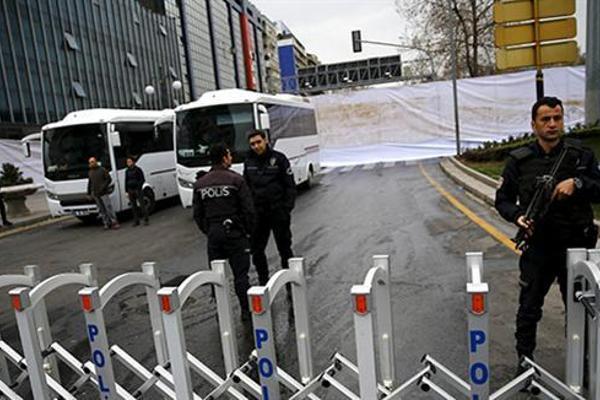Third attack in five months kills at least 37 in Ankara
Fevzi Kızılkoyun – ANKARA


Riot police secure the site of yesterday's suicide bomb attack in Ankara, Turkey March 14, 2016. REUTERS Photo
A bomb attack in Turkey’s capital – the third in just five months – killed at least 37 people and wounded more than 100, with security sources saying the perpetrator spent months in training camps of the outlawed Kurdistan Workers’ Party (PKK).Turkish Health Minister Mehmet Müezzinoğlu put the death toll at 37 early March 14 hours after the deadly attack that struck a busy spot near Ankara’s Güvenpark – a park in Ankara’s central Kızılay neighborhood on March 13.
“The number of those who lost their lives over the terrorist attack that happened by Kızılay’s Güvenpark at 6:45 p.m. yesterday has risen to 37. Some 60 people – 13 of them in intensive care units – are being treated in multiple hospitals,” Müezzinoğlu told reporters during a press conference early March 14.
President Recep Tayyip Erdoğan, who was in Istanbul at the time of the attack, was briefed by Interior Minister Efkan Ala about the blast on the phone, presidential sources said.
“Turkey has become a target of terror attacks due to the instabilities in the region,” Erdoğan said in a written statement released by the presidency to express condolences to friends and relatives of those who died in the attack.
Erdoğan said Turkey would continue its determined fight against terrorism.
“Terror attacks – which intend to target the integrity of Turkey, unity and solidarity of our people – do not diminish our will to fight against terror, but further boost it,” he added.
The presidential sources said a planned trip by Erdoğan to Azerbaijan that was previously scheduled for March 15 had been delayed.
The car used in the bombing exploded at a busy spot between a police checkpoint and 10 bus stops.
“A bomb-laden car caused the blast,” Ala said at a press conference following a security meeting with several cabinet ministers on the deadly bombing late March 13. He said a few hours after the attack that they would have more information about the perpetrators of the attack by March 14.
Security sources said the perpetrator was identified only by the initials S.Ç.D., a female college student from a university in the northwestern province of Balıkesir. She – a PKK militant nicknamed “Avaşin” – joined the outlawed organization in 2013 as she headed to PKK’s training camps in northern Iraq. She has been trained on bombing and covert acts the militant group carries out to target Turkish security forces, the sources told daily Hürriyet without giving their names.
The perpetrator, according to the sources, committed the attack with a partner in crime who is considered to have taken reconnaissance rides around the scene of the bombing. The car used in the attack was transferred to the capital 15 days ago and passed through four provinces before coming to Ankara, they added.
The BMW car had been in the southeastern provinces of Gaziantep and Diyarbakır as well as the southern province of Hatay ahead of the attack, the sources said. The explosives were placed inside the car in early January and the car was sent to the capital on Feb. 27, they added.
The attack sent shockwaves throughout the country as it was the third in five months to have struck central Ankara since October last year.
Davutoğlu said 11 people had thus far been detained over the bomb attack.
“Eleven suspects have thus far been detained in regard to the attack,” said the Turkish premier at a press conference in Ankara on March 14.
Hours after the blast, the Radio and Television Supreme Council (RTÜK) immediately declared a broadcasting ban on images of the scene and victims.
The United States warned its citizens in a March 11 statement over a potential terror attack in Ankara.
“The U.S. Embassy informs U.S. citizens that there is information regarding a potential terrorist plot to attack Turkish government buildings and housing located in the Bahçelievler area of Ankara. U.S. citizens should avoid this area,” read the statement.
In a statement after the attack, the embassy said the source of the information in the warning was Turkish authorities and that it was a routine procedure.
“Last week, the U.S. Embassy became aware of threat information through a Turkish government warning circulating in social media. After confirming the warning with Turkish authorities, the embassy issued a notice to all American citizens in Ankara – both government employees and private citizens – and to Turkish employees of the U.S. Embassy, as we routinely do when we learn of Turkish government information about threats,” the statement read.
Previously, Islamic State of Iraq and the Levant (ISIL) militants bombed a peace rally near the Ankara Railway Station, leaving at least 103 dead on Oct. 10, 2015.
Four months later, a suicide car bomb attack targeted military shuttles in the city on Feb. 17, killing 29 people and injuring 81 others.
